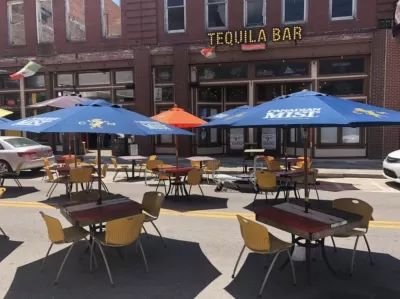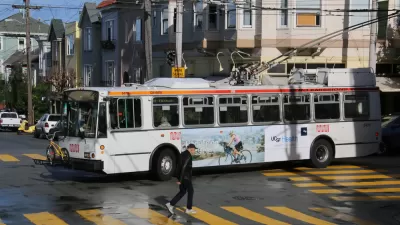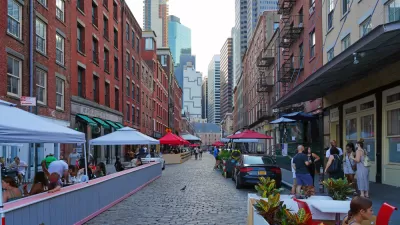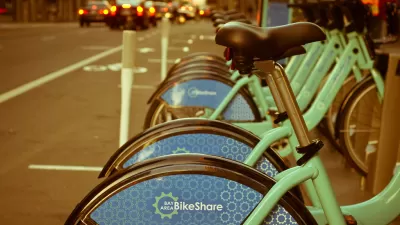The al fresco streets movement, moving dining and retail space into the public realm in space historically devoted to automobiles, continues to gain momentum around the country.

Planetizen has been tracking the increasing deployment of al fresco streets around the country as more cities adopt land use planning and transportation engineering changes to allow for retail and restaurant businesses to set up in the outdoors as the coronavirus pandemic lingers and Americans continue to keep their distance as the economy begins to reopen.
The latest wave of cities to adopt the al fresco streets model for local economic stimulus include San Francisco and Farmingdale, New York, among others reflecting a growing consensus, across wide disparities in geography and economy, of the al fresco streets idea. The differences in each program shows a variety of permitting and design process changes to reflect the unique cities around the country. Given the tough challenges remaining for local businesses during the remaining duration of the pandemic and the experimental aspect of all these changes, streets are likely to continue delivering new iterations of this idea.
In San Francisco, for instance, the city is waiving permitting fees for businesses to fast-track the process of converting to outdoor operations, as described in a paywalled article by Dominic Fracassa. San Francisco is calling its al fresco streets process the "Shared Streets Program." Eve Batey provides additional coverage of San Francisco's Shared Streets Program for Eater LA.
In Farmingdale, an article by Ted Phillips frames the al fresco streets effort as a chance to convert the city's "once bustling" downtown into an "outdoor dining room."
"The village has drawn up plans to close traffic on Main Street and set up 424 seats on Friday and Saturday evenings when restaurants are allowed to reopen," according to Philips. "That lets bars and restaurants with wait service have between 10 and 18 seats on the street in addition to their indoor seating."
The question of whether the measures enacted to support restaurants will be enough to keep businesses alive during the pandemic, is an open question in Farmingdale.
Numerous other large cities around California have implemented al fresco streets programs of some variety in recent weeks, like Long Beach and San Jose. Smaller communities in California, Florida, and New York have also created new al fresco dining opportunities in spaces previously reserved for cars. Albuquerque is on board, too.
The debate about how much public space should be reapportioned to protect Americans from the coronavirus, while also reopening some of the economy to put people back to work, is very much ongoing, so the artifacts of persuasion that have won over skeptical politicians and the public in these cities are notable to advocates. Each new city that decides to convert outdoor space to restaurant and retail uses swings the planning pendulum away from the car-centric tradition. As advocates press holdouts to reconfigure streets, in New York City and Philadelphia, for instance, planners and local officials should be aware of the flexibility of precedent programs to respond to emerging lessons, the unique needs and constraints of each jurisdiction, and ongoing questions about equity and equality in public space.

Planetizen Federal Action Tracker
A weekly monitor of how Trump’s orders and actions are impacting planners and planning in America.

Chicago’s Ghost Rails
Just beneath the surface of the modern city lie the remnants of its expansive early 20th-century streetcar system.

San Antonio and Austin are Fusing Into one Massive Megaregion
The region spanning the two central Texas cities is growing fast, posing challenges for local infrastructure and water supplies.

Since Zion's Shuttles Went Electric “The Smog is Gone”
Visitors to Zion National Park can enjoy the canyon via the nation’s first fully electric park shuttle system.

Trump Distributing DOT Safety Funds at 1/10 Rate of Biden
Funds for Safe Streets and other transportation safety and equity programs are being held up by administrative reviews and conflicts with the Trump administration’s priorities.

German Cities Subsidize Taxis for Women Amid Wave of Violence
Free or low-cost taxi rides can help women navigate cities more safely, but critics say the programs don't address the root causes of violence against women.
Urban Design for Planners 1: Software Tools
This six-course series explores essential urban design concepts using open source software and equips planners with the tools they need to participate fully in the urban design process.
Planning for Universal Design
Learn the tools for implementing Universal Design in planning regulations.
planning NEXT
Appalachian Highlands Housing Partners
Mpact (founded as Rail~Volution)
City of Camden Redevelopment Agency
City of Astoria
City of Portland
City of Laramie






























